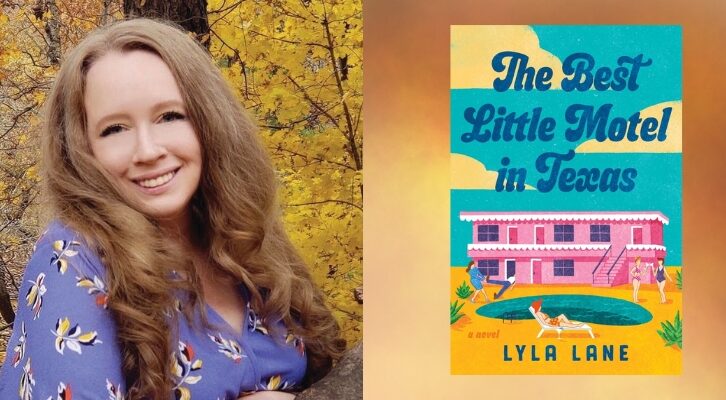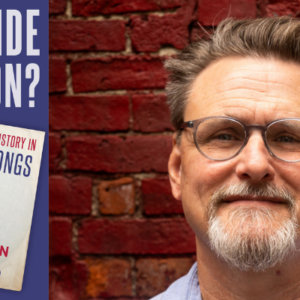
How to Adapt Stephen King: A Conversation with the Duo Behind The Boogeyman
Jonathan Russell Clark Chats with Screenwriters Scott Beck and Bryan Woods
This conversation is presented in partnership with the Refocus Film Festival, a four-day celebration of the art of adaptation and hosted by Iowa City’s nonprofit cinema, FilmScene. The 2nd annual Refocus Film Festival will take place in Iowa City October 12-15, 2023. Passes are on sale now, with individual tickets and full festival announcements coming in September.
*
Scott Beck and Bryan Woods had their work cut out for them. The screenwriting duo behind A Quiet Place and 65 were tasked with adapting Stephen King’s short story “The Boogeyman,” from his 1978 collection Night Shift, a text that Hollywood has ransacked for seven film and five TV adaptations thus far, including Children of the Corn, Cat’s Eye, and Graveyard Shift.
First published in 1973 in Cavalier, “The Boogeyman” is like a lot of early King short stories: it’s very good until it’s very bad. In it, a dejected man named Lester tells a therapist about the deaths of his three children, all of which he blames on the boogeyman. His story unfurls with macabre effectiveness (though it is a bit mired by Lester’s casual hard-R racism and abusive misogyny), and one can see a young King, who during this period was a new dad and a struggling writer, worrying about his ability to protect his child from the horrors of the world. Like Pet Sematary, one could almost be moved by the man’s performance of grief and the rationalizations it often generates; you can see the humanity beneath the supernatural horror.
But then King pulls a stupid horror-magazine bait-and-switch and reveals at the end that the therapist has been the boogeyman all along. This monster with “a scarecrow head” that smelled like “a dead mouse in a pop bottle” apparently disguised its monstrousness and concealed its stench with a human mask, I guess? I don’t know. It’s the kind of ending a 13-year-old boy would think of.
Aside from the bed-shitting conclusion, “The Boogeyman” is a solid story, but there’s really not much to it. How does one turn this 12-page tale into a full-blown Hollywood production? And what do you do about that terrible twist? This is what I set out to find when I interviewed Beck and Woods, starting with the source himself.
*
Jonathan Russell Clark: What was your relationship to Stephen King when you were a kid? How were you first introduced to him?
Bryan Woods: I remember my first introduction to Stephen King was just seeing the covers of his paperbacks in the car of my brother’s truck or something. It was like, scary, scary stuff that I wasn’t allowed to read, or old enough to read, but I’d hear my brothers paraphrase the stories and it would creep me out and it would just create such a memory.
Scott Beck: It was kind of reverse osmosis in terms of knowing Stephen King the name and his movies before understanding like, Oh, he’s an author, and he’s the voice behind all these movies. So as a five- or six-year-old, I would be watching Firestarter or Maximum Overdrive [based on a story from Night Shift] and consuming these things that had the King name on it. And then because I was a kid, I was going through the library and found Creep Show, the graphic novel, and I was like, Oh, wait, this also has the King name on it, but it’s not a movie. I started flipping through it, and that was kind of my gateway.
“The Boogeyman” is like a lot of early King short stories: it’s very good until it’s very bad.
JRC: When it came down to adapting this story into a film, what was the first breakthrough in terms of figuring out an angle?
BW: It took years to find a window into that story. Scott and I had optioned it with a different studio, and a different group of producers, many years before we had it set up at Fox. And we just really couldn’t figure it out. It’s a short story. It’s terrific and it’s terrifying, but it’s not really a movie. We just kept asking, how do you expand it and how do you stretch it? Years later, we just kept circling back to these themes of fatherhood and responsibility, and realizing that we could maybe take that story and use it as almost an inciting incident, that the entire movie could be almost a sequel of sorts to that short story.
It was already tricky, because Lester in the short story is such an unlikable character. He’s such a character of his time—the stuff that comes out of his mouth. Our immediate gut is because he’s the lead of the story that he would be the lead of the film, but we could just never quite wrap our heads around it.
So I think once we thought, What if Lester is instead the inciting incident? If this is the character that Stephen King is afraid of becoming, then what if we use that as a jumping off point? And what if the doctor who’s speaking with Lester—what if he’s afraid of becoming Lester, and the whole movie’s about the doctor’s fear of not being present as a father, not being there, and not being able to protect his children?
JRC: It’s such a brilliant stroke, making the therapist the protagonist. And it definitely feels like the story is just as much about King worrying about his capabilities as a father.
SB: Because it feels like with any great artist like King, there’s inevitably something personal in it, even if it’s disguised under multiple layers. And I think there’s something resonant with the boogeyman, when reading it, where it’s like, Are you as a human being able to accidentally devolve into who Lester Billings is—whether it’s through alcoholism or being a neglectful parent? Or is it the undercurrent of Lester being an abusive parent? There are all these alternate realities that each of us have, based on a multitude of decisions, and I find that, at its core, kind of terrifying about “The Boogeyman” in specific.
“It’s a short story. It’s terrific and it’s terrifying, but it’s not really a movie.”
BW: Well, it’s just the opening lines of that short story, which are really so powerful, and one of the reasons we wanted to adapt it. Lester doesn’t say, “The boogeyman killed my kids.” He says, “I murdered my three kids, one at a time.” And the way that he immediately, with the opening line, takes responsibility for what happened to the kids is, I think, a key to where King’s head was at, but it was also something that really spoke to us. It’s such an unnerving line.
JRC: Your films have a thread running through them all, which is the characters are always being hunted externally by forces that represent their internal struggles. A Quiet Place, Haunt, Spread, even 65. Is that something you’re conscious of?
SB: I think that probably comes from a healthy fear of death, I guess. [Laughs.] You know, like the fear of loss. And maybe that’s not just my own death but losing those around me, and sometimes that can be sudden and sometimes that can be slow. Neither is easy.
And sometimes you just do the same thing over and over again, and you find a different package for it.
JRC: I wasn’t trying to imply that you’re repeating yourselves. I think all interesting artists have themes they return to again and again.
BW: It’s interesting. I mean, you’re articulating to us things that we are doing in our work that we are less aware of. And it’s really interesting to hear that, and I think it was beautifully put. There is a degree of repeating ourselves. I know you said you’re not accusing us of that, but it’s actually really interesting to hear that because I think maybe we should steer away from beating the drum over and over again.
“I think there’s also just a superficial explanation: we like to torture our characters.”
SB: I was just gonna jump in and say I think it’s escapism, but by way of our ambition, to funnel through either our own neuroses or something that we think is important to communicate or just commiserate with audiences. And so we always try to find that vessel. In this case, it’s the boogeyman. In 65 it’s dinosaurs. With A Quiet Place, it’s aliens. With Haunt, it’s mass murderers. And so, we’re always trying to find that degree of cinema as escapism, but the hope is it’s like a seven-layer casserole, at least the scripts, even if the final movies don’t reflect the ambition at which we’re trying to hit.
These are all different things that we’re trying to find ways to Trojan horse in. And maybe that’s grief. Maybe it’s ideas of belief or non-belief, and ideas of issues with family turmoil. These are all things that I think are very much present in those last three or four films.
BW: I think there’s also just a superficial explanation: we like to torture our characters. We like to put them through a hellish experience. And that’s just become a thing we enjoy.
When we were young screenwriters, we would treat our characters so nice because we like our characters. And every scene would play to their favor because we were afraid to put them through the wringer. Like A Quiet Place was a moment of, What’s the worst thing that we can imagine happening? And then just beat after beat after putting them through that grinder.
And that is 1,000 percent in the tradition of Stephen King. He’s always writing on those two different layers. He does it so well. As one of our heroes, we’re almost sadly just kind of ripping off how he approaches story, because he’s such a major influence on our work, clearly.
Jonathan Russell Clark
Jonathan Russell Clark is the author of Skateboard and An Oasis of Horror in a Desert of Boredom. His writing has appeared in the New York Times, L.A. Times, Boston Globe, and Esquire. He's also a columnist for Tasteful Rude.



















